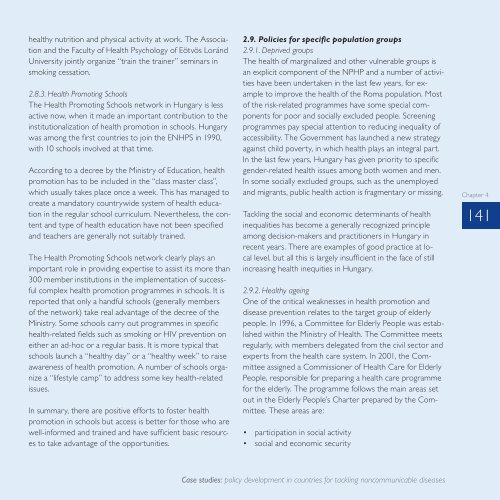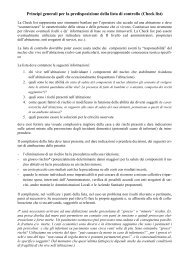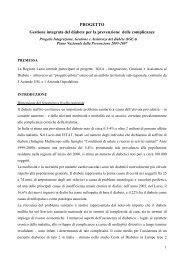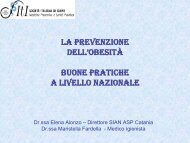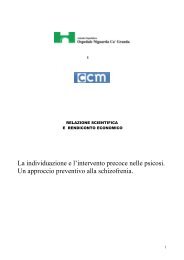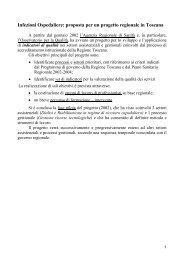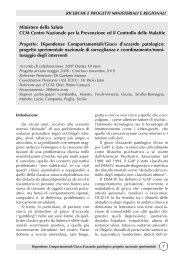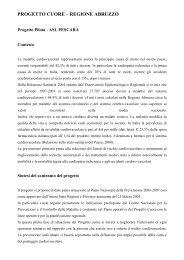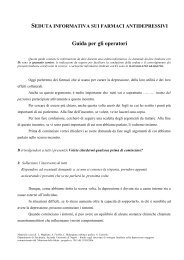Gaining health : analysis of policy development in European ...
Gaining health : analysis of policy development in European ...
Gaining health : analysis of policy development in European ...
Create successful ePaper yourself
Turn your PDF publications into a flip-book with our unique Google optimized e-Paper software.
<strong>health</strong>y nutrition and physical activity at work. The Association<br />
and the Faculty <strong>of</strong> Health Psychology <strong>of</strong> Eötvös Loránd<br />
University jo<strong>in</strong>tly organize “tra<strong>in</strong> the tra<strong>in</strong>er” sem<strong>in</strong>ars <strong>in</strong><br />
smok<strong>in</strong>g cessation.<br />
2.8.3. Health Promot<strong>in</strong>g Schools<br />
The Health Promot<strong>in</strong>g Schools network <strong>in</strong> Hungary is less<br />
active now, when it made an important contribution to the<br />
<strong>in</strong>stitutionalization <strong>of</strong> <strong>health</strong> promotion <strong>in</strong> schools. Hungary<br />
was among the first countries to jo<strong>in</strong> the ENHPS <strong>in</strong> 1990,<br />
with 10 schools <strong>in</strong>volved at that time.<br />
Accord<strong>in</strong>g to a decree by the M<strong>in</strong>istry <strong>of</strong> Education, <strong>health</strong><br />
promotion has to be <strong>in</strong>cluded <strong>in</strong> the “class master class”,<br />
which usually takes place once a week. This has managed to<br />
create a mandatory countrywide system <strong>of</strong> <strong>health</strong> education<br />
<strong>in</strong> the regular school curriculum. Nevertheless, the content<br />
and type <strong>of</strong> <strong>health</strong> education have not been specified<br />
and teachers are generally not suitably tra<strong>in</strong>ed.<br />
The Health Promot<strong>in</strong>g Schools network clearly plays an<br />
important role <strong>in</strong> provid<strong>in</strong>g expertise to assist its more than<br />
300 member <strong>in</strong>stitutions <strong>in</strong> the implementation <strong>of</strong> successful<br />
complex <strong>health</strong> promotion programmes <strong>in</strong> schools. It is<br />
reported that only a handful schools (generally members<br />
<strong>of</strong> the network) take real advantage <strong>of</strong> the decree <strong>of</strong> the<br />
M<strong>in</strong>istry. Some schools carry out programmes <strong>in</strong> specific<br />
<strong>health</strong>-related fields such as smok<strong>in</strong>g or HIV prevention on<br />
either an ad-hoc or a regular basis. It is more typical that<br />
schools launch a “<strong>health</strong>y day” or a “<strong>health</strong>y week” to raise<br />
awareness <strong>of</strong> <strong>health</strong> promotion. A number <strong>of</strong> schools organize<br />
a “lifestyle camp” to address some key <strong>health</strong>-related<br />
issues.<br />
In summary, there are positive efforts to foster <strong>health</strong><br />
promotion <strong>in</strong> schools but access is better for those who are<br />
well-<strong>in</strong>formed and tra<strong>in</strong>ed and have sufficient basic resources<br />
to take advantage <strong>of</strong> the opportunities.<br />
2.9. Policies for specific population groups<br />
2.9.1. Deprived groups<br />
The <strong>health</strong> <strong>of</strong> marg<strong>in</strong>alized and other vulnerable groups is<br />
an explicit component <strong>of</strong> the NPHP and a number <strong>of</strong> activities<br />
have been undertaken <strong>in</strong> the last few years, for example<br />
to improve the <strong>health</strong> <strong>of</strong> the Roma population. Most<br />
<strong>of</strong> the risk-related programmes have some special components<br />
for poor and socially excluded people. Screen<strong>in</strong>g<br />
programmes pay special attention to reduc<strong>in</strong>g <strong>in</strong>equality <strong>of</strong><br />
accessibility. The Government has launched a new strategy<br />
aga<strong>in</strong>st child poverty, <strong>in</strong> which <strong>health</strong> plays an <strong>in</strong>tegral part.<br />
In the last few years, Hungary has given priority to specific<br />
gender-related <strong>health</strong> issues among both women and men.<br />
In some socially excluded groups, such as the unemployed<br />
and migrants, public <strong>health</strong> action is fragmentary or miss<strong>in</strong>g.<br />
Tackl<strong>in</strong>g the social and economic determ<strong>in</strong>ants <strong>of</strong> <strong>health</strong><br />
<strong>in</strong>equalities has become a generally recognized pr<strong>in</strong>ciple<br />
among decision-makers and practitioners <strong>in</strong> Hungary <strong>in</strong><br />
recent years. There are examples <strong>of</strong> good practice at local<br />
level, but all this is largely <strong>in</strong>sufficient <strong>in</strong> the face <strong>of</strong> still<br />
<strong>in</strong>creas<strong>in</strong>g <strong>health</strong> <strong>in</strong>equities <strong>in</strong> Hungary.<br />
2.9.2. Healthy age<strong>in</strong>g<br />
One <strong>of</strong> the critical weaknesses <strong>in</strong> <strong>health</strong> promotion and<br />
disease prevention relates to the target group <strong>of</strong> elderly<br />
people. In 1996, a Committee for Elderly People was established<br />
with<strong>in</strong> the M<strong>in</strong>istry <strong>of</strong> Health. The Committee meets<br />
regularly, with members delegated from the civil sector and<br />
experts from the <strong>health</strong> care system. In 2001, the Committee<br />
assigned a Commissioner <strong>of</strong> Health Care for Elderly<br />
People, responsible for prepar<strong>in</strong>g a <strong>health</strong> care programme<br />
for the elderly. The programme follows the ma<strong>in</strong> areas set<br />
out <strong>in</strong> the Elderly People’s Charter prepared by the Committee.<br />
These areas are:<br />
• participation <strong>in</strong> social activity<br />
• social and economic security<br />
Chapter 4<br />
141<br />
Case studies: <strong>policy</strong> <strong>development</strong> <strong>in</strong> countries for tackl<strong>in</strong>g noncommunicable diseases


